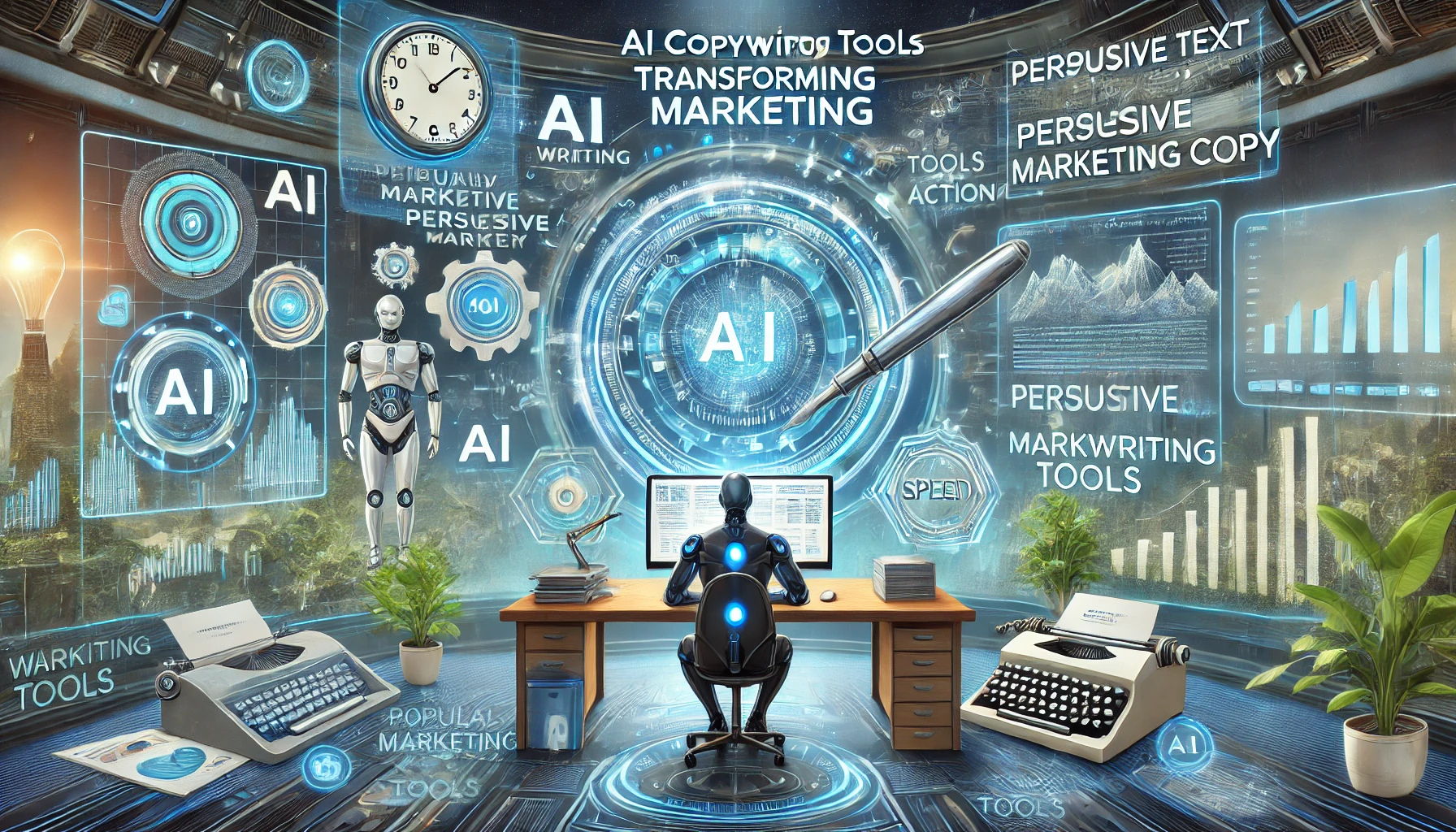
Introduction
Copywriting is a cornerstone of effective marketing, essential for capturing attention, engaging audiences, and driving sales. Traditional copywriting can be time-consuming and labor-intensive, but the landscape has changed dramatically with the rise of AI copywriting tools. These tools leverage artificial intelligence to generate high-quality, persuasive copy in a fraction of the time it takes a human writer. In this article, we will explore how AI copywriting tools work, their benefits, popular tools available on the market, and best practices for integrating them into your marketing strategy.
What Are AI Copywriting Tools?
AI copywriting tools are advanced software applications that use machine learning, natural language processing (NLP), and large datasets to create written content. These tools can generate headlines, product descriptions, ad copy, social media posts, and more. They work by analyzing patterns in existing text to produce new copy that mimics the tone, style, and intent of human writers.
How AI Copywriting Tools Work
- Natural Language Processing (NLP): NLP allows AI to understand the structure and meaning of human language. It enables the tool to interpret prompts, generate relevant content, and refine the text to match specific requirements such as tone, style, and length.
- Machine Learning Models: AI copywriting tools are powered by advanced models like GPT-4 and other deep learning algorithms trained on millions of content pages. These models learn the nuances of language, enabling them to generate coherent, persuasive text tailored to the target audience.
- Data Analysis for Optimization: AI copywriting tools can analyze SEO metrics, audience engagement data, and current market trends to create optimized content. This ensures that the generated copy is well-written and effective in achieving marketing goals.
- Feedback Loop for Continuous Improvement: These tools learn from user feedback and continuously refine their output. This adaptive learning process helps improve the accuracy and relevance of the content generated over time.
Popular AI Copywriting Tools
Several AI copywriting tools have gained recognition for their ability to enhance content creation and marketing strategies. Here are some of the most popular options:
- Copy.ai: Known for its ability to generate creative and engaging marketing copy, Copy.ai offers a range of templates designed for specific content types, from blog introductions to social media captions.
- Jasper AI: Jasper AI is one of the leading AI copywriting tools widely used for generating high-quality, persuasive copy. It provides a range of writing styles and tones, making it suitable for various marketing needs.
- Writesonic: Writesonic helps marketers create SEO-friendly copy, including blog posts, landing pages, and product descriptions. It’s known for its user-friendly interface and ability to generate content that ranks well on search engines.
- Rytr: Rytr is a versatile tool that supports multiple languages and offers various tones of voice, allowing users to craft content that fits their brand’s style. It’s ideal for generating articles, emails, and more.
- Anyword: Anyword specializes in generating marketing copy that converts. It uses predictive analytics to score different copy versions, helping marketers choose the most effective campaign wording.
Applications of AI Copywriting Tools
AI copywriting tools have diverse applications, enhancing marketing efforts and content creation across various industries. Here are some key applications:
- Ad Copy and Headlines
- AI tools can generate catchy and persuasive headlines, slogans, and ad copy that grab attention and drive clicks. By analyzing what works in the market, these tools help create high-converting copy that resonates with audiences.
- Example: Advertisers often use Jasper AI to craft compelling Facebook ads and Google Ads copy, optimizing text for better performance and engagement.
- Product Descriptions for E-commerce
- Writing unique and engaging product descriptions for hundreds of items can be daunting. AI copywriting tools automate this process, creating descriptions highlighting product features and appealing to potential buyers.
- Example: E-commerce sites like Shopify stores utilize Copy.ai to generate optimized product descriptions for both readability and SEO quickly.
- Social Media Content
- Keeping up with the demand for fresh, engaging social media content can be challenging. AI tools help generate posts, captions, and hashtags that align with current trends, keeping the brand’s social presence active and relevant.
- Example: Social media managers use Writesonic to draft Twitter posts, Instagram captions, and LinkedIn updates that maintain brand voice and engage followers.
- Email Campaigns and Newsletters
- AI copywriting tools streamline email campaign writing by generating personalized subject lines, introductory hooks, and persuasive calls to action. This automation improves open rates and overall campaign effectiveness.
- Example: Rytr helps marketers craft email sequences that guide prospects through the sales funnel, increasing conversions and engagement.
- SEO Content Optimization
- Optimizing content for search engines requires carefully crafted keywords, readability, and relevant information. AI tools can generate SEO-friendly blog posts, meta descriptions, and title tags, enhancing search engine rankings.
- Example: Anyword provides SEO-focused content suggestions that help businesses rank higher on Google, driving more organic site traffic.
Benefits of AI Copywriting Tools
- Time and Cost Efficiency: AI copywriting tools dramatically reduce the time needed to draft, edit, and publish content. This efficiency allows businesses to produce more content at a lower cost, making it especially beneficial for startups and small businesses.
- Consistency and Scalability: AI ensures a consistent brand voice across all marketing materials. It allows rapidly scaling content creation efforts, meeting growing demands without sacrificing quality.
- SEO Optimization: By integrating keyword research and SEO best practices into the content creation process, AI tools help improve the visibility and reach of marketing materials, driving more organic traffic.
- Creativity Boost: AI copywriting tools can provide inspiration, providing multiple variations of copy that help marketers overcome writer’s block and explore new creative angles.
- Personalization and Targeting: Advanced AI tools can tailor copy to specific audience segments, creating personalized content that resonates with individual readers. This targeting improves engagement and conversion rates.
Challenges and Considerations
- Maintaining Human Touch: While AI-generated copy is highly effective, it can sometimes lack the nuance, empathy, and creativity of human writers. Regular editing and personalization are essential to maintain a natural and authentic tone.
- Risk of Plagiarism: Although AI tools are designed to create original content, unintentional plagiarism’s still risky. Using plagiarism detection tools is important to ensure the copy is unique.
- Quality Control: The quality of AI-generated content depends on the input provided. Vague or poorly defined prompts can lead to subpar results, requiring careful refinement of inputs for optimal output.
- Ethical Considerations: As AI tools become more prevalent, ethical concerns arise regarding transparency and the potential for AI-generated content to mislead. Ensuring clear disclosure of AI use in content creation is essential.
- Dependence on Technology: Over-reliance on AI can lead to a reduction in human creative skills. It’s crucial to strike a balance, using AI to enhance, rather than replace, human creativity and input.
Tips for Effectively Using AI Copywriting Tools
- Start with Clear Prompts: The more specific the input, the better the output. Clearly outline the goals, audience, and desired tone to guide the AI in generating relevant content.
- Edit and Personalize: Always review AI-generated content and make necessary adjustments. Personalization ensures the copy resonates with the target audience and maintains the desired brand voice.
- Combine AI with Human Creativity: Use AI tools as a starting point, integrating your insights and creative touches. This combination results in a copy that is both efficient and engaging.
- Monitor Performance: Track how AI-generated content performs and use analytics to refine your approach. Understanding what works helps optimize future content strategies.
- Stay Updated on Tool Capabilities: AI tools constantly evolve, with new features and improvements regularly introduced. Stay informed about updates to maximize the potential of these tools.
Conclusion
AI copywriting tools are reshaping the world of marketing and content creation, offering businesses a powerful way to enhance productivity, creativity, and effectiveness. By automating the writing process, these tools free up time for marketers to focus on strategy and innovation, driving better results with less effort. However, the best outcomes are achieved when AI-generated content is combined with human oversight, ensuring the copy remains authentic, relevant, and aligned with brand values.


1 thought on “AI Copywriting Tools: Enhancing Marketing and Content Strategies”